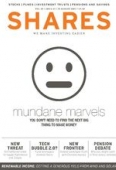Archived article
Please note that tax, investment, pension and ISA rules can change and the information and any views contained in this article may now be inaccurate.
Fund managers dismiss tech bubble fears

Record-setting share prices this year are sparking renewed fears of a technology sector sell-off of potentially epic proportions. Share prices in industry giants including Amazon, Apple, Facebook and Google-parent Alphabet have rallied strongly through 2017 to trade at historic levels.

The S&P 500 tech sector has been one of this year’s top performing sub-sectors gaining around 25%, while the S&P 500 benchmark, the technology-specific Nasdaq, and the small-cap Russell 2000 indices have also all set new closing records in 2017.
But technology facing investment trusts managers dismiss any notion that we are heading for tech collapse 2.0, in other words a repeat of the massive crash of 2000 to 2003.
‘It is perhaps understandable that investors are nervous,’ says Walter Price, who runs the Allianz Technology Trust (ATT). He admits that some valuations look hugely expensive at face value, online shopping colossus Amazon on 145-times forward earnings, for example, based on Reuters Eikon data.
Earnings support
Yet there is a major difference between current ambitious investment multiples versus those of the late 1990s – real earnings.
‘In the technology bubble of the late 1990s, there were no earnings and stock market valuations were based on clicks or eyeballs, or any variety of unusual valuation metrics,’ Price says. This time round technology share prices are rising with earnings hikes that are outstripping an otherwise low growth environment.
‘While valuations have trended higher, the investment backdrop remains favourable and the prevailing inflation rate remains broadly supportive of current equity valuations,’ says Polar Capital Technology Trust (PCT) manager, Ben Rogoff. ‘Fortunately, the US is experiencing its fasest pace of earnings growth in five years with S&P 500 earnings forecast to increase 10% this year, with potentially more to come in 2018 if the new administration delivers on its tax reform pledge.’
Recent trading updates from many of the global technology industry heavyweights appear to support the positive view. South Korean electronics giant Samsung set a record for net profit in a single quarter to 30 June, making it the world’s most profitable company.
Facebook’s second quarter revenue beat market expectations, increasing 45% year-on-year to $9.3bn, while Apple’s third quarter (2 August) impressed investors enough to set a new share price record of $157.14. Net cash grew to a record $262bn.

Underlying valuations
Apple shares are currently trading on a forward price to earnings (PE) multiple of less than 15, according to Reuters Eikon, Facebook, Alphabet and Microsoft are all on PEs in the 20s. That’s a far cry from the euphoric ratings of 18 years ago, when Microsoft was valued at nearly 50-times earnings, and Intel and Oracle sported three-digit PEs.
‘Alphabet has seen its earnings per share increase 23-fold while its stock has increased 12-fold since its IPO,’ explains Polar’s Rogoff.
‘In our opinion, the technology environment is better than it has been for a decade,’ says Allianz’s Price. ‘People are spending money, corporate projects are getting funding, and manufacturing equipment is being upgraded. It appears that companies are feeling better about the future than they have been since the recession of 2007.’
But perhaps the biggest difference between tech markets then and now is the internet, and the massive business growth it is enabling. Tom Stevenson, investment director with Fidelity International, believes easy web access today, and the convenience of connected smartphones and fast connections makes all the difference. Where maybe 300m people used the internet in the late 1990s, the number is 10-times that today.
This makes genuine business disruption on a scale never seen before possible. It took hotels chain Marriott nearly 90 years to get to 700,000 rooms. AirBnB has hit 1.5m in just seven.
Important information:
These articles are provided by Shares magazine which is published by AJ Bell Media, a part of AJ Bell. Shares is not written by AJ Bell.
Shares is provided for your general information and use and is not a personal recommendation to invest. It is not intended to be relied upon by you in making or not making any investment decisions. The investments referred to in these articles will not be suitable for all investors. If in doubt please seek appropriate independent financial advice.
Investors acting on the information in these articles do so at their own risk and AJ Bell Media and its staff do not accept liability for losses suffered by investors as a result of their investment decisions.

 magazine
magazine










